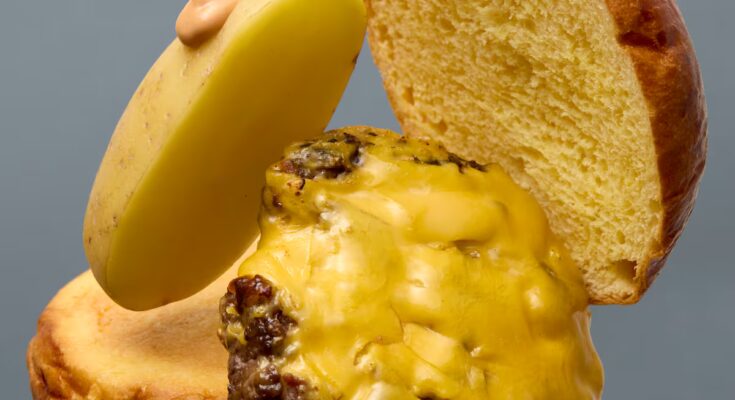Spain is no longer the country of tortilla sandwiches and skewers. A study carried out last year by Ipsos for the food delivery platform Just Eat placed the hamburger at the top of Spaniards’ preferences. 50% even admit to consuming it at least once a week. As for tastes, according to the same survey, 64% prefer meat as the base of their hamburger, compared to 30% who opt for chicken. And when it comes to pairings, 80% opt for cheese, 56% for onion, 53% for bacon and 35% prefer pickles. Seen like this, anyone would say that this sandwich, the most famous in the world, has always been present on our tables, but, like democracy, it had to fight hard to make its way into a gastronomy that, in the years of the Franco regime, was still seen as a foreign and low-quality product. Half a century later, the hamburger lives in confusing times, between tradition and new, more radical trends such as smash the burger (that flattened disc of meat), which revolutionized griddles.
The first Burger King to open in Spain, in the Plaza de los Cubos in Madrid, did so in June 1975, a few months before the death of the dictator, and it took until 1981 to try the first McDonald’s Big Mac on the capital’s Gran Vía. In the same year, Alfred Gradus (New York, 1941-Madrid, 2020) left his job at the US military base in Torrejón de Ardoz (Madrid) to bring his passion for barbecue to a place in via Lagasca which still has a permanent parish today. “We have old customers, who came as children with their parents or grandparents and who now bring their grandchildren,” says Ana Galindo (Larache, Morocco, “who cares my age”), widow of this pioneer who had become passionate about barbecue and cowboy hats when, at just 17 years old, he joined the army to escape the violence of the Bronx and was destined for Texas.
The Barbacoa burger at Alfredo’s, “made of beef, has nothing else”, says Galindo, has changed little in these 44 years, but its legendary barbecue sauce, created jointly a few days before the opening of the restaurant, has changed even less. Gradus had the invaluable help of jazz singer Donna Hightower, who at the time was performing at the now-defunct Whiskey Jazz venue on Villanueva Street. “She came from Belgium, because she had married a Belgian. Alfredo often went to see her perform and they ended up becoming very good friends. For the barbecue sauce, everyone contributed what they knew. Donna was an excellent cook,” recalls Galindo.
If the Gradus barbecue demonstrated that a burger does not necessarily have to be the one offered by franchises, Óscar Colmenares (Bogotá, 67 years old) decided to put an end to the transition. He too had ended up in Madrid a few years earlier fleeing violence, in this case from Colombia. “There, all the entrepreneurs were extorted,” he recalls, sitting at the table of one of the stores of his New York Burger chain, which he opened in Madrid in 2008. His goal was to ennoble a product that many still saw as a simple fast food. “They considered it junk food and we said to ourselves: why not give it back its status? Why not a well-made hamburger with good bread, with good meat, good vegetables? We wanted to do something good and, moreover, in a nice and well-decorated place,” he explains.
A few years later, his son Pablo (Bogotá, 37 years old) will join the project and, after attending the Le Cordon Bleu school in London and DiverXo, he will become executive chef of a brand that already has 10 restaurants in Madrid and Barcelona. “For me it was a natural evolution,” explains the chef. “I started from the bottom and little by little I grew within DiverXo. I experienced a very beautiful transition moment, in which we went from the two Michelin stars we had at the time to the third, in 2013.” Its incorporation into the New York Burger has breathed new life into a menu that continues to constantly renew itself. The basis, however, is always the same. “For the hamburger we use various cuts of meat. We have the lid, the lid and above all the shank. And we also add some ribs, which being fatter gives it that point of greasiness. We calculate the percentage of fat to always be as exact as possible. The fat is vital, if there is no fat there is no fun”, explains the chef, who adds that the entire process is one hundred percent artisanal. And that meat, aged between 20 and 25 days maximum, is cooked in the grill oven with walnut charcoal, to give it that smoky touch that makes the difference.
To see the benefits of grilling and the delicacy of smoking in just one bite, all you have to do is try their Empire State burger, which in addition to cheese Cheddar is crowned with pulled pork (chopped pork) smoked for seven hours. Or the Fourth of July, which includes a very special bacon: “It’s a bacon that we roast for about six hours very slowly until it reaches a soft, honeyed consistency. Then we smoke it for about six hours and it’s roasted on the coals,” explains Pablo. “They are two sandwiches that unite the two souls of the New York Burger,” adds the father.
Ten years after the arrival of New York Burger, meat enthusiast Juancho de la Rica (Madrid, 40) will join this trend in 2018 by democratizing a quality burger by opening his first location in Madrid’s Chamberí market. “Juancho had been grilling barbecue for years and trying out new cuts for friends. After traveling, learning, and surrounding himself with like-minded people, he created Juancho’s BBQ to do what he loved most: cook good grilled meat for his friends and family,” says his partner and director of marketingJuanma Díaz-Pinés (Madrid, 40 years old), by email. Initially the business focused on all types of cuts of meat, but De la Rica hit the target with his burger, whose philosophy is “less is more”. “It was a complement, a different burger, designed to be enjoyed at its best and made with the same love and need as everything that comes off the grill,” says Díaz-Pinés. But in those years, contests began to become popular, and Juancho’s stood out from the start with its Bacon Juancheeseburger. “It won the now cloned award for the best hamburger in Spain for the first time and we will hold it from 2019 to 2022. Since then we have no longer participated in competitions, we believe there are already too many”, complains the director of marketing. Today, in addition to 10 restaurants (nine in the Community of Madrid, in places and markets such as Chamberí or San Leopoldo, and another in Valladolid), they offer their food truck at events such as football matches, company parties and even weddings.
Certainly, in recent years, the hamburger is experiencing a constant revolution, with a certain tension between the more classic style proposals and the more radical ones, such as the emergence of the smash the burgersomething that doesn’t entirely convince those who opt for quality meat. “It seems silly to me,” says Ana Galindo. “It’s for those who don’t like meat. Those who like the taste of meat don’t like that”, he adds, promising to never have it on Alfredo’s menu. “We did an experiment, but the customer is sovereign and we read that it was not the time. In food truck “Yes, we grill them, but we don’t crush them much, the truth is that we don’t like crusts,” admits Díaz-Pinés. Even at New York Burger they gave a twist to the concept so as not to give in to the pressure of this trend. “THE destroy It doesn’t require high-quality meat, anything will do,” explains Óscar Colmenares. “Because it’s so toasted, it doesn’t contain juice or anything else. What gives it its flavor are the sauces. We make one in our own way, finer than our normal burgers but without reaching what you see today. “That way it’s still juicy.”
When it comes to drawing red lines, the executive chef of New York Burger has a very clear one, although it’s more orange than red: “I try not to get into areas where I’m not proud of the product, like putting Risketos powder or crushed Doritos,” says Pablo Colmenares. “You can do a thousand things because a hamburger is a sandwich and you can add everything that people want to order in a sandwich, but another thing I wouldn’t do, for example, is replace bread with donuts. I have a limit there,” he adds.
For many, bread is precisely the place where you begin to build an asset burgers. Anna Bellsolà (Girona, 51 years old) belongs to the fourth generation of a family of bakers from Girona. In 2007 he opened his bakery project, Baluard, in Barcelona’s Barceloneta neighborhood, to make, as he says via email, “good bread, with the flavor of bread” in his workshop. It works with natural ingredients, French flours, natural yeasts, long processes and cooking in a wood oven. Plus, she’s a big fan of burgers. “I like all types, but for me the perfect one is very classic, has good bread, not very dense meat, cheese and pickles, and if it’s grilled all the better.” And what, in your opinion, is the ideal bread for an ideal hamburger? “I would look for one that is totally natural, light, tasty, which at the same time provides nutritional value and goes well with beef,” he explains, and suggests his own creation: “We have a dough in Baluard which, being very hydrated, gives it lightness. It mixes wheat, toasted malt, honey and has seeds on top. It is also dark, which makes it visually very attractive.”

Everyone agrees on the importance of the bun when assembling the burger. So much so that the case of Juancho’s barbecue was investigated until the last moment. “We spent three months trying different breads and found ours one day after opening,” recalls Juanma Díaz-Pinés. Pablo Colmenares has his own recipe: “A bakery prepares it for us, with wheat flour, potatoes and a fairly high percentage of butter. It’s a special butter which, when we toast the sandwich, gives it a melting consistency.”
To freely paraphrase the American writer Mark Twain, “only the best burgers are made from sacred cows”, and today there are many to choose from, from the most classic to the most daring. “The hamburger is a universal food and has been delighting people here since the seventies, but now there are many brands, and not all of them offer the same to the consumer. There is a lot of variety and a very good average level. Not all of them stand out, but those that do, do so a lot”, concludes the director of the Hamburger. marketing from Juancho’s barbecue.

Gastro Special from ‘El País Semanal’
This report is part of the Gastro Special prepared by “El País Semanal” and EL PAÍS Gastro, which will be published in its paper edition on Sunday 23 November.



